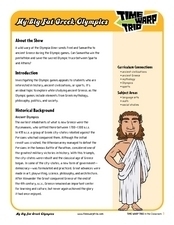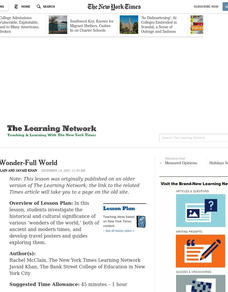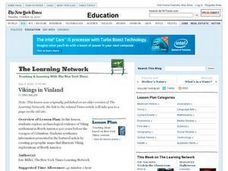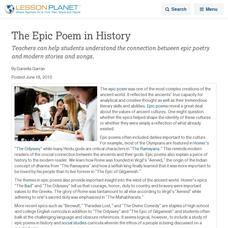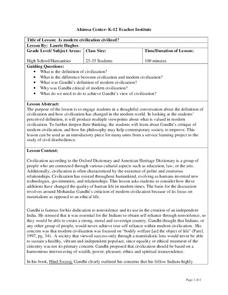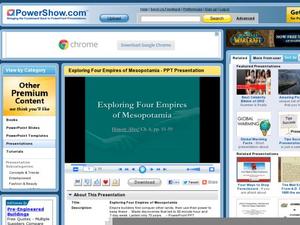Curated OER
Ancient Civilizations: Medieval and Early Modern Times
Seventh graders gain an understanding of the history of Mongolian culture through making inferences about Mongolian artwork
Time Warp Trio
The Seven Blunders of the World
Learners explore the cultures and civilizations of Mesopotamia. They take a look at the factors that shaped the region, and study the history of the Hanging Gardens of Babylon, and other ancient wonders of the world. The class is divided...
Time Warp Trio
My Big Fat Greek Olympics
The Olympic Games are indeed a significant and far-reaching cultural component in our international community today, but from where do they originate? Where do our traditions stem from, and how do we choose the sports that constitute...
Curated OER
Lesson: After Nature: Dystopia and Detournement
Werner Herzog's film, Lessons of Darkness is the topic of this lesson on art, politics, and culture. Learners discuss the concepts of utopia, dystopia, detournment, and Scorched Earth then compose a paper which describes dystopian reality.
Illustrative Mathematics
Converse of the Pythagorean Theorem
Use the given tasks and detailed teacher's commentary to introduce your 8th graders to the Pythagorean theorem and its converse. Embedded links to information about Egyptian geometry make your presentation interesting. Consider...
Time Warp Trio
See You Later, Gladiator!
Young historians take a look at the age of gladiators, and the cultural atmosphere present when they staged their epic battles. Pupils pretend to be reporters and write newspaper articles about one of the events they stage. Then,...
Curated OER
MAKE YOUR OWN BOOK OF THE DEAD
Young scholars study the Book of the Dead and its importance to Ancient Egyptian culture, identify with ancient Egyptians through reading about their culture and religion, and use scroll-shaped paper and colored pencils to create their...
Curated OER
What a Wonder-Full World
Students investigate the historical and cultural significance of various 'wonders of the world,' both of ancient and modern times, and develop travel posters and guides exploring them.
Curated OER
Solving Mummy Mystery Helps History Come Alive
Young scholars uncover more mysteries of Ancient life. They see how artifacts can reveal much about a complex culture's history and beliefs. They study the long line of ancient Egypt's pharaohs.
Curated OER
Vikings in Vinland
Students examine the role of archaeology in gaining information about past civilizations. After reading an article, they discover evidence of the Viking settlement of North America. They summarize the information in the article by...
Curated OER
The Epic Poem in History
Teachers can help students understand the connection between epic poetry and modern stories and songs.
Curated OER
Microbes & History: Microbial influence on the spread of Civilization
Students explore how to extract plant fibers from the flax plant Linum usitatissimum in the process of making linen fibers. Doing so spark interest in the importance of microbial action on the spread of human culture and civilization.
Curated OER
The Greek Gods
What were the early Greek myths? Have elementary students examine the Persian Wars and read various Greek myth in order to identify the cause and the results of the Persian Wars. Myths, activities, simulations, and a unit plan are links...
Curated OER
Power of Symbols in West African Art
Students examine and analyze symbols used in the Asante community of Ghana and look at the history of power struggles in West Africa. They discover how to express meaning and power as they create their own symbols and short stories...
Curated OER
Poverty Point Earthworks: Louisiana's Ancient Inhabitants
Students research the prehistoric earthworks site at Poverty Point, Louisiana. They compare the Louisiana artifacts and structure to the remains and knowledge of other ancient cultures. They present their research to the class.
Curated OER
Is Modern Civilization Civilized?
Students examine the concept of civility. In this modern civilization lesson, students study Gandhi's teaching about the attributes of civilized societies and discuss how they can contribute to fostering civilization in their own community.
Curated OER
Relative Dating in Archaeology
Students create a timeline that explains how ancient cultures used artifacts. In this Relative Dating in Archaeology lesson plan, students examine artifacts and draw conclusions about their origins. Then students analyze antiquated...
Curated OER
Toward Civilization
High schoolers are asked to define the term civilization. They work in small groups, each group is given the option of researching either the Neanderthal civilization or that of ancient Egypt. Students apply their definition to two...
Curated OER
Exploring Four Empires of Mesopotamia
Discover what life was like under each of the four main empires that ruled ancient Mesopotamia. Kids can read along or take notes on the Akkadian, Babylonian, Assyrian, and Neo-Babylonian empires. Notes include dates, key rulers,...
Curated OER
Learning From the Past
Coming up on the Olympics? Be sure your middle schoolers understand the dynamic and ancient history of this global tradition. They begin by recalling traditions parents have passed down, considering their relevance and ways they might be...
Curated OER
Mini Coil Pots: Ceramics Lesson
Art is a wonderful way to teach historical or cultural concepts. Here, learners view a series of coil pots that have been created throughout history by a variety of civilizations. They then create and decorate a pot of their own that...
Curated OER
Me Oh Maya
Students compare basketball to Mayan ring-ball. They write a newspaper article that may have been published during Mayan times.
Curated OER
Working 9 to 5 in Ancient Egypt
Students create a pyramid diagram that reflects the social order in ancient Egypt and compare the ancient social order with the social order in our world today.
Curated OER
The Use of Myths in Science
Learners are told stories, myths and legend to explain their world. After telling the tales and discussion them, students are assigned to write a myth that describes a familiar situation, such as why the school garbage cans are always...




